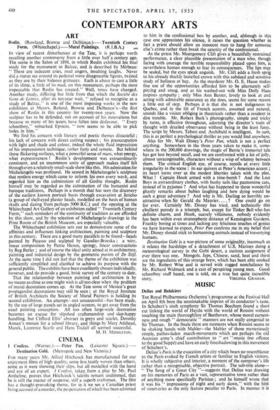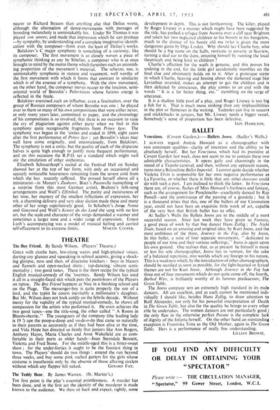- MUSIC Delius and Balakirev THE Royal Philharmonic Orchestra's programme
at the Festival Hall on April 8th bore the unmistakable imprint of its conductor's taste. In Schubert's sixth symphony Sir Thomas Beecham found a short cut linking the world of Haydn with the world of Rossini without touching the main thoroughfare of Beethoven, whose moral earnest- ness and rough " democratic " manners are not really congenial to Sir Thomas. In the finale there are moments when Rossini seems to be shaking hands with Mahler—the Mahler of those mysteriously simple, pathos-laden march-movements which are perhaps the old Austrian army's chief contribution to " art "-music (no offence to the good Suppe) and have an early foreshadowing in this movement of Schubert's.
Delius's Paris is the evocation of a city which bears no resemblance to the Paris evoked by French artists or familiar to English visitors. It is wholly subjective and interior, a moment of the composer's life rather than a recognisable, objective portrait. The sub-title alone- " The Song of a Great City "—suggests that Delius was drawing on his memories of Paris as a vast, representative town rather than of anything more specifically Parisian ; and he himself wrote that it was his " impressions of night and early dawn," with the hint of street-cries as the only feature peculiar to Paris. In manner it is nearer to Richard Strauss than anything else that Delius wrote, although the alternation of dance-movementS with passages of brooding melancholy is unmistakably his. Under Sir Thomas it was played con amore, and made that impression which he can produce sympathy, by understanding and a complete imaginative identifi- cation with the composer—from even the least of Delius's works.
Balakirev's C major symphony is something of a curiosity, like its composer. The first movement is as closely woven a piece of symphonic thinking as any by Sibelius, a composer who is at once brought to mind by the motto theme which furnishes such an astonish- ing proportion of the movement's material. The scherzo, too, is unmistakably symphonic in stature and treatment, well worthy of the first movement with which it forms that contrast in similarity which is of the essence of a symphony. With- the slow movement, on the other hand, the composer moves nearer-to the luscious, semi- oriental world of 'Borodin's Polovtsians whose furious energy is reflected in the finale.
Balakirev exercised.such an infludhce, even a fascination, over the group of Russian composers of whom Borodin was one ; he played over to them so many of his own compositions that were either never, or only many years later, committed to paper, and the chronology of his compositions is so involved, that there is no occasion to raise the cry of plagiarism against either party when we find in this symphony quite recognisable fragments from Prince Igor. The symphony was begun in the 'sixties and ended in 1898, eight years after the first performance of Prince Igor ; yet Borodin's ideas may well have come originally, and unconsciously, from Balakirev. The symphony is not a unity, but the quality of each of the disparate halves is quite high enough to justify more frequent performance, and on this occasion the R.P.O. set a standard which might well stir the emulation of other orchestras.
Elisabeth Schwarzkopf's recital at the Festival Hall on Sunday showed her at the top of her form, with only an occasional and scarcely noticeable hoarseness remaining from the severe cold from which she has recently suffered. She proved herself above all a miniaturist—in Mozart's Zauberer, Bizet's Pastorella (something of a surprise from this most German artist), Brahms's folk-song arrangements and-Wolf's Elfenlied. The purity and incisiveness of her tone, her mastery of the smallest inflections of expression, her wit, a charming delivery and very clear diction made these and many other of her songs superlatively good. In Schubert's Junge Nonne and Ganymed and Wolf's Kennst du das Land she sang with no less art, but the scale and character of the songs demanded a warmer and sometimes a larger tone and a wider range of expression. Ernest Lush's accompanying was a model of musical feeling and carried self-effacement to its extreme limits. MARTIN COOPER.



































 Previous page
Previous page